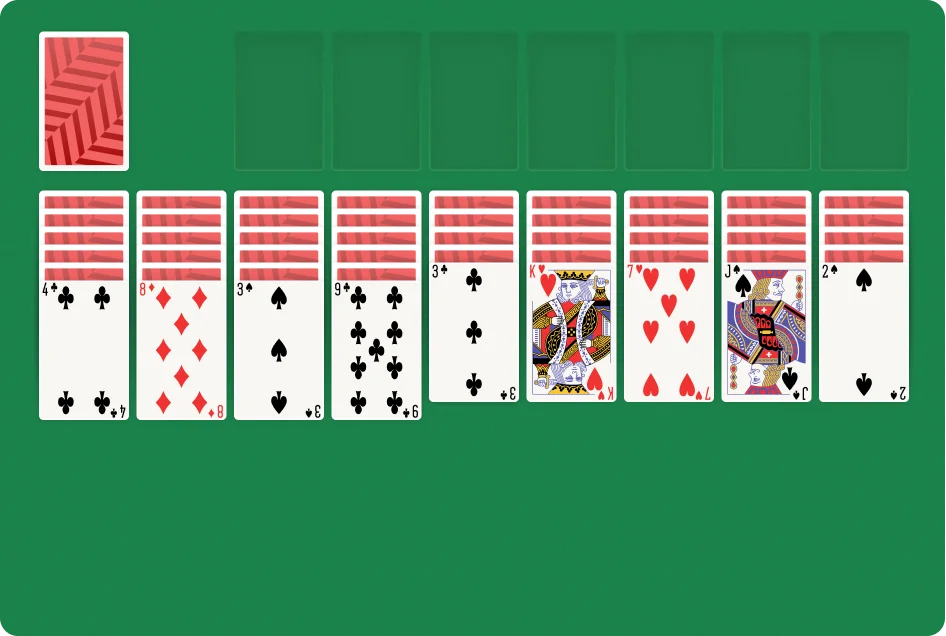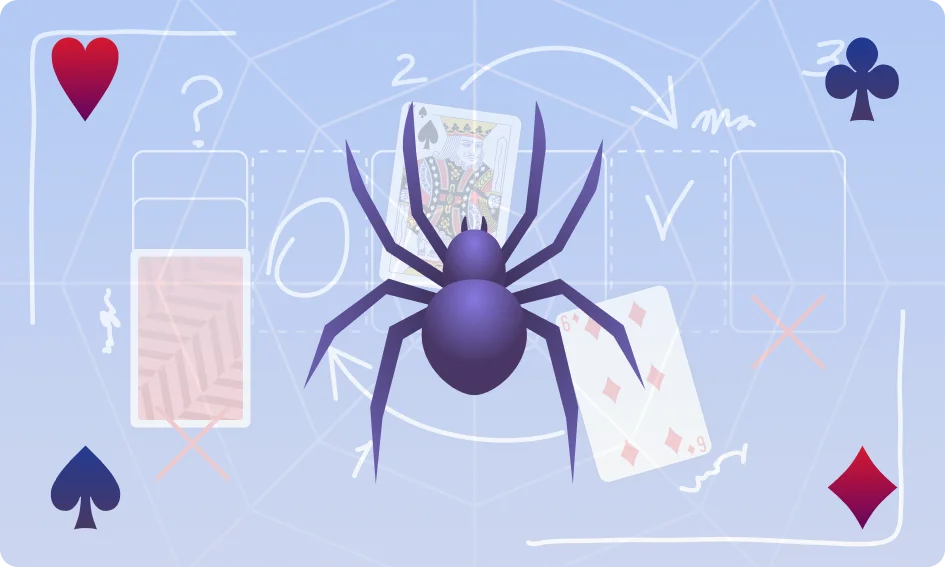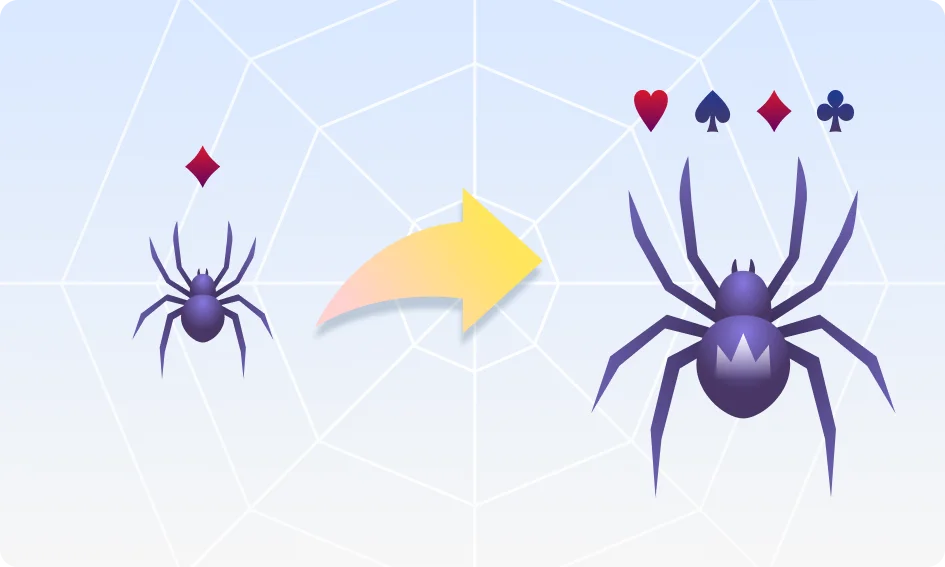By nature, Solitaire is a game that’s meant to test your resilience, sharpness of mind, and, most importantly, patience. My experience with the game has led me to conclude that no game embodies Solitaire’s authenticity more than 4 Suits Spider Solitaire. A variant of the classic Spider Solitaire, it ramps up the gameplay’s difficulty by not one, not two, but four levels! So, it’s not surprising that many players stick to the relative comfort of 1 Suit and 2 Suits Spider Solitaire. They never dare to take on the challenge that 4 Suits presents.
However, 4 Suits is not that difficult to master compared to 2 Suits or even 1 Suit. Before you call me crazy for suggesting this, note that the game’s difficulty does not lie in the complexity of its layout. Instead, it lies in the lack of a proper layout and player tactics. I used to curse the game for being unfairly difficult until I realized that the problem lay with my playing style.
So, how exactly are we supposed to keep 4 Suits Spider Solitaire organized (when it’s a game that’s almost always cluttered)? In this blog, I will offer some tips, tricks, and strategies. These should help you address the mistakes that have been preventing you from mastering 4 Suits Spider Solitaire.
4 Suits Spider Solitaire’s Layout

Before we get to strategy, let me provide a quick refresher on what exactly 4 Suits Spider Solitaire is and what the rules are. The objective in the game is to create sequences of cards in descending order (from King to Ace) within each of the four suits (Diamonds, Hearts, Clubs, and Spades). Once a sequence is complete, you remove it from the layout and the play continues for the remaining three sequences.
The game’s layout consists of a series of 10 cards arranged in a horizontal line, all face-down. On top of this initial row, you place four additional rows of face-down cards, with each row slightly overlapping the one below it. In the first four columns, you add an extra face-down card. Following this, you flip over the topmost card in each column to reveal its face. You set aside the rest of the deck, which isn’t used in the main layout. This forms the stock pile.
The rules of the game are surprisingly simple:
- You can move face-up cards to another card as long as the card being moved is one rank below the card it’s being moved to.
- You can always bring in a new row of cards from the stock pile by placing one face-up card on each column’s topmost card.
- You can move multiple cards in sequence together.
- You can also move a card or sequence of cards to an empty column.
Strategies to Keep Your 4 Suits Spider Solitaire Game Organized
You’re now equipped with the knowledge to start playing 4 Suits Spider Solitaire. You can incorporate the following strategies to level up your Solitaire skills.
1. Make Sure You Understand the Layout
There is a reason why I first provided a quick overview of 4 Suit Spider Solitaire’s rules before getting to strategy. You’d be surprised how many people play the game just by trial and error. They never bother to read the (very few) rules. As such, it’s unsurprising that their growth with this variant is limited. They’re often unaware of the many unconventional moves Spider Solitaire allows one to make.
It’s always a good idea to go over the rules before you get started with a complex solitaire variant, especially if you’re returning to it after a hiatus or after spending time playing a more basic variant (like Klondike Solitaire). Our minds aren’t supercomputers. Sometimes, even seasoned players confuse Spider Solitaire’s rules with those of other variants.
2. Use The Empty Columns
Empty columns are one of the biggest assets in 4 Suits Spider Solitaire. They’re usually formed after you’ve completed and removed one or more sequences from the layout. So, it’s also a good indicator of the progress you’ve made in the game. A mistake that players make is to leave these empty columns untouched throughout the game.
Instead, you should use them to make the layout more flexible – an extra space you can move cards into. This allows you to uncover new cards and build new sequences in other columns.
3. Only Use the Stock pile When Necessary
The stock pile consists of the extra cards that weren’t used in the main layout. You can call on these cards whenever you run out of moves to make. Using the stock pile is an integral part of the gameplay. But, many players tend to abuse this feature. We’re all guilty of trying to find shortcuts when playing games. Although this strategy can work in other board games, it doesn’t do you any good in 4 Suits Spider Solitaire.
A good rule of thumb is that you should analyze the layout for at least two minutes before considering using the stock pile. I know, 120 seconds can feel like forever in these situations. But, it’s just enough time for you to discover optimal moves without succumbing to the temptation of drawing fresh cards from the stock pile.
4. Start Making Sequences by Suit Early in the Game
The game’s end goal is to have four nicely arranged stacks with all the cards in descending order according to their suit. Yet, many players are tempted to ignore this important fact early on in the game. They start moving cards based on rank alone.
I used to do so when I was a beginner. Later, I learned that this strategy likely leads to a loss as the game progresses. Make sure that you don’t disregard a card’s suit early on in the game.
5. Move Multiple Cards Together
One of the best things about Spider Solitaire’s gameplay is that it allows you to move multiple cards together. For example, if you have cards in the sequence 9, 8, and 7 of Hearts, then you can move this entire sequence onto a 10 of Hearts.
I’ve included this rule in the list because many players don’t know about this life-saving aspect of the game. I was unaware of this rule when I first started playing Spider Solitaire. Imagine my surprise (and joy) when I finally discovered it.
6. Don’t Prioritize Clearing the Columns
Many players place unnecessary emphasis on cutting off column lengths by moving cards into other columns. Some do this just to enjoy the sight of an empty column, while some do it subconsciously (we are motivated by seeing what appears to be actual progress). Either way, you should avoid this practice if you want to win at 4 Suits Spider Solitaire. Let the empty columns form naturally and focus on building sequences that will actually help you reach the end of the game.
7. Don’t Be Afraid To Undo Wrong Moves
We all make mistakes; it’s nothing to be ashamed of. Many people believe that using the undo button is a bad habit (and they’re technically correct). That said, there’s no harm in using it occasionally to correct a wrong move.
In fact, I’d encourage you to use it as many times as you need to. Recognizing a mistake and then correcting it is exactly how the learning process works. Do it enough times, and you’ll teach your brain to recognize bad calls before you make them.
8. Use Hints Sparingly
Abusing the hint button hampers you from getting better at the game. A good way to break the bad habit of over-relying on hints is to set a limit. So, if you’ve used a hint, then make a rule that you can’t use it again for at least the next 10 moves. This way you’ll be able to gently force your brain to fire up its neurons instead of waiting for help.
It’s also worth noting that hints aren’t always reliable. Sometimes, they don’t highlight the most optimal moves. They can inadvertently lead you to get stuck later on in the game. Also, many players have reported that hints will send them into a loop of placing a card in the same two positions.
9. Be Patient
Patience is your best friend if you want to master 4 Suit Spider Solitaire. It allows you to declutter your mind and make optimal decisions. Indeed, ‘Solitaire’ is also called ‘Patience’.
But, what exactly do I mean by ‘patience’ here? Put simply, you should sit in a comfortable position, put your favorite drink and/or snack next to you, and immerse yourself in the game without external distractions. While you’re playing, remember to avoid being hasty. Give yourself time to think and calculate the best possible moves.
Conclusion
Few can boast that they have a high win rate in 4 Suits Spider Solitaire. Yet, it is actually not that difficult to achieve this status. All you need to do is follow some relatively straightforward tactics. These will ensure that you’re playing the game with maximum efficiency.





